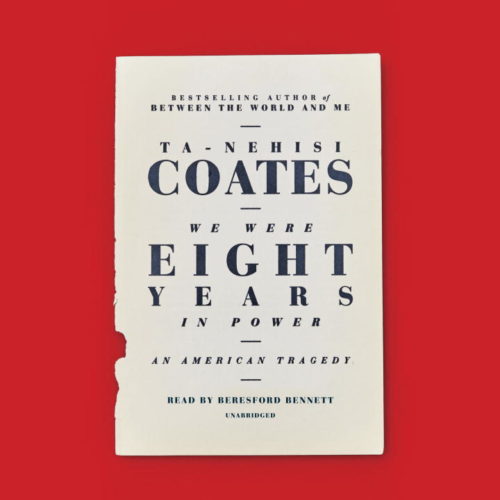 With his new book We Were Eight Years in Power, Ta-Nehisi Coates has become an indispensable American writer. In Between the World and Me he demonstrated a terrible sorrow and gravitas. With Power, he shows that his analytic skills, his command of American history, his controlled anger and his sharp, elegiac style have reached full maturity.
With his new book We Were Eight Years in Power, Ta-Nehisi Coates has become an indispensable American writer. In Between the World and Me he demonstrated a terrible sorrow and gravitas. With Power, he shows that his analytic skills, his command of American history, his controlled anger and his sharp, elegiac style have reached full maturity.
Coates believes in the efficacy of historical research, in primary sources, in the slow accretion of voices and documents and in the larger portraits those sources reveal. In Power he describes both the permutations of systemic racial hatred and injustice suffered by black men, women and children in this country over time, the miracle of the Obama Presidency, and the white backlash to his eight years that conjured Donald Trump as his successor.
The book is structured around eight features originally published in The Atlantic and eight contemporaneous ‘notes’ or essays which describe Coates’ changing perspective on President Obama’s eight years in office. His subjects include Michelle Obama, The Civil War, Malcolm X, Reparations and Mass Incarceration. He traces how the barbarous nature of slavery has been kept alive and current since Emancipation. Those effects include the terrorism of the Klan and White Citizen’s Groups, Jim Crow, the organized State violence of police, the courts and prisons in the South during that time; the closing out of FDR’s New Deal to African Americans, the devil’s bargain made by the President to keep Southern Democrats in the fold; the use of real estate ‘redlining’, restrictive housing covenants, and predatory lending practices to keep black people isolated and unable to build wealth through homeownership; the poor funding of black schools; the use of fines to prey upon black communities and keep many townships and counties supplied with funding; gerrymandering and voter suppression and the prison and incarceration boom fueled by the ‘war on drugs’; a death toll among black people at the hands of police out of all proportion to their numbers. In his feature “My President Was Black”, Coates marshals in order all the comments, slights, threats and obstruction heaped upon President Obama by Republicans and their allies in the revanchist media. As a reader, he summons you to witness that avalanche, “an eight year campaign of consistent and open racism aimed at the leader of the free world [that] helped clear the way” for the election of Donald Trump (334).
His portrait of President Obama is not a hagiography. It is nuanced, critical, never fawning, but it is also joyful. How else might one describe this sentence from Coates’ description of Obama’s first Inauguration: “… the car slow dragging down Pennsylvania Avenue, the crowd cheering, and then the two of them rising up out of the limo, rising up from fear, smiling, waving, defying despair, defying history, defying gravity” (341).
Power is not a screed nor is it self-defeating. Coates keeps an even tone throughout. He lets his research make his point. His gathering of facts is crushing, infuriating, empowering — you cannot read this book and remain placid and blandly optimistic. Coates is a tragedian but not given to despair. His explorations “had not given [him] hope, [but] it had, at least, granted clarity” (223).
Publication date, October 3, 2017.
Coates is undoubtedly the closest thing we have to an intellectual heir to James Baldwin. Yet as much as I respect Coates’s work—admittedly I am only familiar with his writings at The Atlantic—I think it fails to rise up to Baldwin’s level. Perhaps he can achieve that position, even surpass it, in another 10 or 20 years, but not now. It is not that I disagree with Coates’s conclusions as much as I question their usefulness beyond being a kind of ideological dogma. For all his intellectual vigor and historical accuracy, there is something missing in his words; the edges are too blunt, the conclusions too certain, the tone too didactic. Baldwin’s best writing, no matter how uncomfortable or challenging it might have been (and still may be) for his white audiences, was suffused with a self-awareness, a generosity of spirit, a kind of eloquent, respectful pity, and above all a love for humanity that Coates’s writing does not possess.
Where Coates preaches fire and brimstone, Baldwin speaks with the measured self-assuredness of someone who has spent a lifetime on the frontline and has seen that the path to victory lies not in overwhelming force, but through moral suasion and profound empathy. If he pleaded with his countrymen to do more, to be better people and citizens, it wasn’t simply because the weight and burden of historical evidence compelled them to do so; it was because their decency and the decency of their country depended on it.
Most importantly Baldwin possessed the one indispensable quality that is too often absent in those who would move others to action: legitimacy. Not a legitimacy derived from the heft of facts or historical precedents, mind you. Such authority is common amongst public intellectuals, and both Coates and Baldwin possess it in abundance. But Baldwin alone possesses the rarer, and invariably more potent type of legitimacy; that which is born from the courage to be honest about one’s struggles to overcome the very flaws and inadequacies and prejudices that one condemns. In the end his gaze was fixed as much, if not more so, on himself as it was the rest of the country. He understood a truth—maybe the truth—that Coates does not yet seem able to admit: that to dismantle structures and change the course of history, one must first transform themselves.